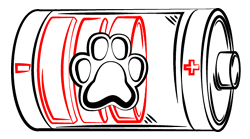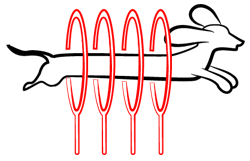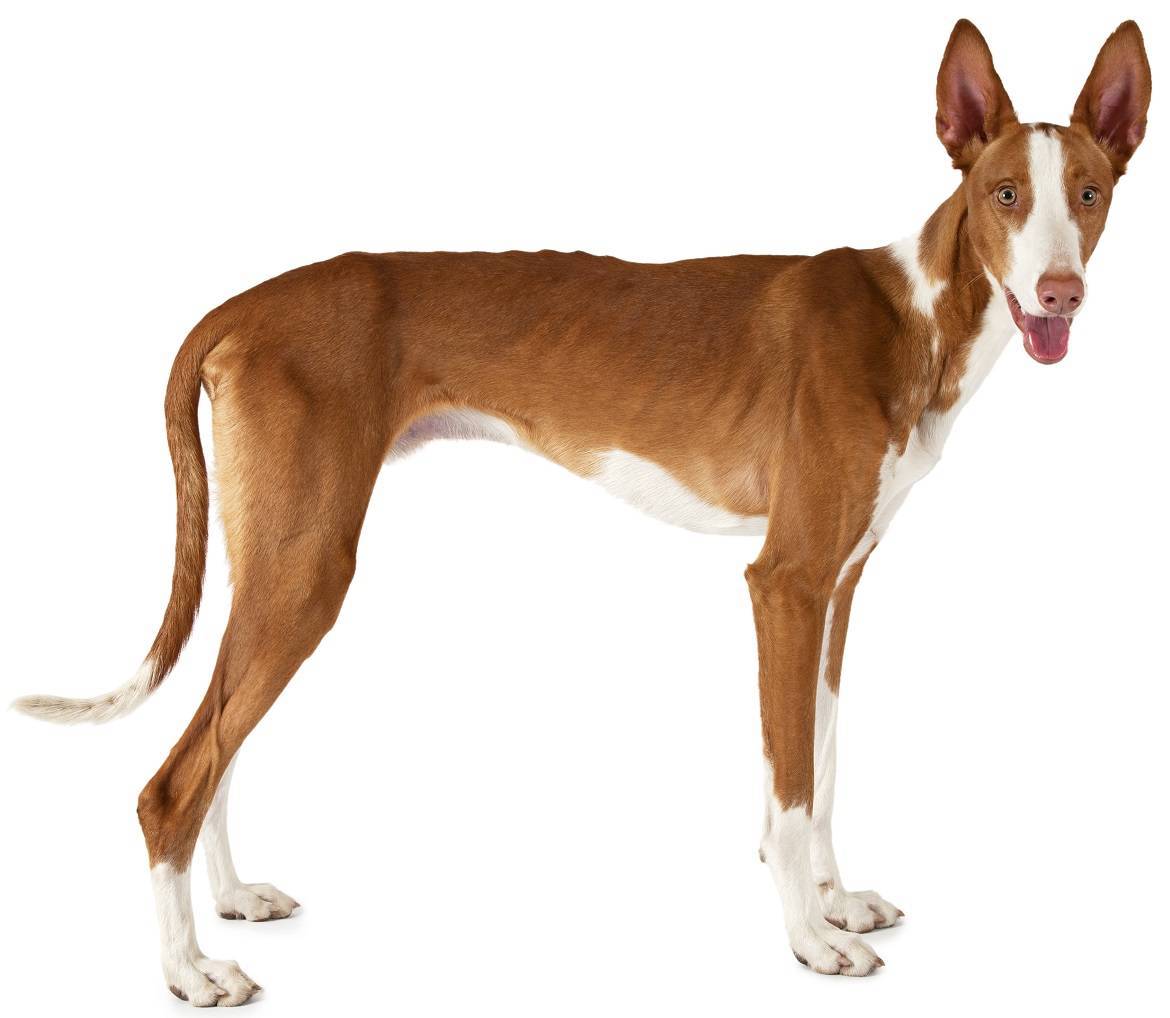
Paws ‘N’ Pups Quickview
Size
| Energy Level
| Trainability
| Paws ‘N’ Pups Rank
|
Characteristics
| Physical Characteristics: Height: 22-27” Weight: 45-50 lbs. Energy Level: High | Colors: The American Kennel Club recognizes the Ibizan Hound in the following colors:
|
Health & Longevity
Average Life Span: 10-14 years
The Ibizan Hound is a healthy dog, but he may be prone to a few health problems in some cases.
Hip dysplasia, a condition in which the thighbone cannot fit properly into the malformed hip joint, may affect some Ibizan Hounds. Hip dysplasia results in discomfort, pain, limping, and, in severe cases, arthritis or even lameness. Surgery may be required to correct very serious cases. Dogs with hip dysplasia should not be bred, so ensure your puppy’s parents have no history of the condition. Although it is hereditary, hip dysplasia can also be triggered by rapid weight gain or injury, likely caused by jumping or falling.
Hypothyroidism can be an issue for some Ibizan Hounds as well. Hypothyroidism is when the thyroid gland does not produce sufficient amounts of hormones, leading to problems like infertility, hair loss, obesity, and lethargy. Treatment is available, but the affected dog will need to take daily medication for the remainder of his life.
Eye problems like cataracts and retinal dysplasia can be issues for some Ibizan Hounds. Retinal dysplasia causes round clumps to develop in the eye’s retinal tissue. It is not painful or progressive, but it can cause vision problems for the affected dog. There are three types of retinal dysplasia, the most severe of which causes the retina to detach, leading to blindness.
Axonal dystrophy, the degeneration of cells and tissues in the brain, is a highly rare condition that may be seen in Ibizan Hound puppies. Some Ibizan Hounds may also experience seizures, allergies, or deafness.
The average lifespan for an Ibizan Hound is 10-14 years.
Temperament & Train-ability
The Ibizan Hound is elegant, polite, and even-tempered. He is also affectionate, loyal, and family-oriented. He is an active and intelligent dog who was originally bred to hunt rabbits and other small game.
This breed can live happily in an apartment if adequately exercised. The Ibizan Hound needs at least a couple of walks or runs each day. He is calm and quiet indoors, but he can become destructive and noisy if he is not properly exercised,or if he becomes bored or lonely. The emotionally sensitive Ibizan Hound needs a home that is peaceful, with little tension or fighting. Otherwise, he can become nervous and even develop digestive problems. Also be sure not to leave food out around an Ibizan Hound, as he is sure to eat it if given the chance. They become cold easily and will need a dog sweater or coat if outdoors in cold weather.
The Ibizan Hound, nicknamed the Beezer, is excellent with children, becoming clownish, playful, and affectionate. However, he should be supervised around younger children. He may chase kids if they run. The Beezer is aloof with strangers, but he is typically not shy or aggressive. Proper socialization is needed to ensure he does not become timid. This breed enjoys the company of other dogs and is friendly with them. At the same time, he has an incredibly high prey drive and is not suited for homes with small animals. In some cases, the Ibizan Hound can learn to get along with cats if raised with them. Due to their prey drives, the Ibizan Hound must be leashed or securely fenced at all times outdoors. They are extremely skilled jumpers and need a fence that is at least 6 feet tall to prevent them from escaping.
The Ibizan Hound is intelligent and quick to learn, but he will easily become bored with repetitive training sessions. Keep sessions short, upbeat, varied, and challenging to maintain the Beezer’s engagement. This breed has a bit of a stubborn streak at times, and you will need to demonstrate that you are the boss consistently. Use positive reinforcement like favorite treats, extra playtime, and verbal praise. Due to his sensitivity, the Ibizan Hound needs gentle and positive training methods. Still, the Ibizan Hound is more receptive to training than the average sighthound. Although this breed is not difficult to house train, crate training is recommended to prevent the Ibizan Hound from getting into trouble when unsupervised.
Grooming
The Ibizan Hound’s coat can be shorthaired or wirehaired. Regardless, the coat will need a weekly brushing to keep your dog looking his best. Bathe the Ibizan Hound only as needed.
Trim nails regularly; do not allow them to reach the floor. Check ears weekly for signs of infection such as redness, tenderness, and odor. Ensure that there is not an excessive buildup of wax, dirt, or debris. Brush teeth at least 2-3 times weekly to prevent bad breath and maintain healthy gums.
Diet
On average, the Ibizan Hound should consume 2-3 cups of high-quality dry dog food daily. Divide food into at least two smaller meals each day.
Ensure that your Ibizan Hound has access to clean, fresh drinking water at all times.
Looking for an Ibizan Hound?
 Find An Ibizan Hound Breeder |  Ibizan Hound Puppies For Sale |  Adopt An Ibizan Hound |
Cost
Due to his rarity, the Ibizan Hound is one of the more expensive dog breeds, costing about $1,300 on average, although some may be much pricier. Prices vary according to breeder location, gender, pedigree, and whether the dog is considered pet quality or show quality.
If you decide to adopt an Ibizan Hound, adoption fees may cost up to $175.
Paws ‘N’ Pups Ranking
Paws ‘N’ Pups ranks every breed out of 4 with 1 being easiest to integrate into your life and 4 being the toughest – The lower the ranking the better.
Ranking takes into account a few basic factors including cost, skill level needed, high vs low maintenance and how critical regular training is to success. The Ibizan Hound ranks a 2.5. He is healthy, polite, and able to get along with most people and dogs, and he is low maintenance in regards to grooming. However, he cannot live in a home with smaller pets, he is very sensitive and requires a calm and peaceful environment, and he needs at least a 6-foot high fence to prevent him from escaping the yard. He also may be slightly difficult to train, and he is a rare and expensive breed.
Breeds Similar To Ibizan Hound
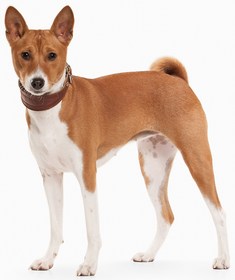 Basenji | 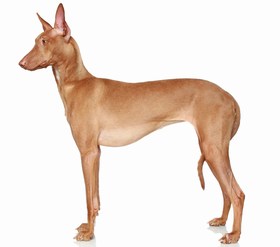 Pharaoh Hound | 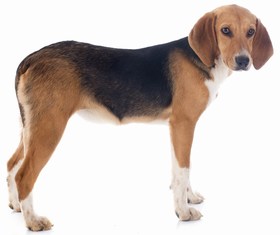 Harrier |  Cirneco Dell’Etna |


